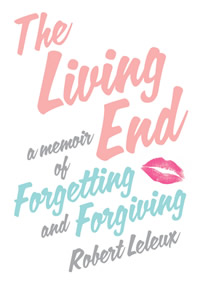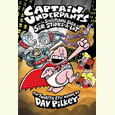A Radical Act of Love
When his grandmother was diagnosed with Alzheimer’s, memoirist Robert Leleux unexpectedly found his chance to have, at last, a happy family
The Memoirs of a Beautiful Boy, Robert Leleux’s first book—which New York Times critic Janet Maslin called “head-tossing, high-strung comedy”—is a coming-of-age story that begins when Leleux is sixteen and his father leaves the family for a pregnant jockey. His mother responds to this change of fortune with vast quantities of alcohol, an Audrey Hepburn videotape on continuous replay, and the determination to land a new “Mr. Wonderful” who will rescue them from poverty. (In explaining this unlikely narrative arc, Leleux writes, simply, “We’re from Texas.”) While his mother is engaged in a self-reinvention project prominently featuring wigs and plastic surgery, Leleux himself is gradually awaking into authenticity, acknowledging that he is gay and falling in love with the man who is now his husband.
His new book is a different kind of coming-of-age tale. Marked with the same humor and generosity in the face of family dysfunction, The Living End: A Memoir of Forgetting and Forgiving is nevertheless a sadder, more universal story. Like Beautiful Boy, it opens with a tragedy, but this time the chance for a happy ending is far from inevitable, severely constrained by the nature of the setback: the Alzheimer’s diagnosis of Leleux’s beloved grandmother, who took him in as a teenager when his mother left for California on her hunt for a new husband. As the maternal figure at the center of this story, Joanne shares some of the qualities that made her daughter such a centrifugal force in Leleux’s first memoir: a sharp wit, a gift for zingers, a desire to be the center of attention, and a ferocious love for Robert Leleux. Unfortunately, another thing the two women share is the belief that she has been unforgivably wronged by the other. By the time Joanne is diagnosed with Alzheimer’s, she hasn’t spoken to her only child for the better part of thirty years.
 The Living End is the story of the way Leleux navigates the twin poles of mother and grandmother, as well as the labyrinth of hospitals and specialists he is cast into as his grandmother’s caregiver. To anyone unfamiliar with Leleux’s sense of humor and unerring ability to locate and memorialize absurdity in all its guises, this will no doubt sound like a dreary tale best avoided until life offers no way around it. In fact it is an absolute pleasure to read this gentle, funny, deeply wise memoir of how an encounter with incurable illness turns a boy into a man, and angry people into a family again. Leleux answered questions from Chapter 16 via email prior to his appearance at Parnassus Books in Nashville on January 30.
The Living End is the story of the way Leleux navigates the twin poles of mother and grandmother, as well as the labyrinth of hospitals and specialists he is cast into as his grandmother’s caregiver. To anyone unfamiliar with Leleux’s sense of humor and unerring ability to locate and memorialize absurdity in all its guises, this will no doubt sound like a dreary tale best avoided until life offers no way around it. In fact it is an absolute pleasure to read this gentle, funny, deeply wise memoir of how an encounter with incurable illness turns a boy into a man, and angry people into a family again. Leleux answered questions from Chapter 16 via email prior to his appearance at Parnassus Books in Nashville on January 30.
Chapter 16: Immediately after Joanne’s surgery, when the nurse began to explain how to care for your grandmother’s wounds, your grandfather fled the scene. Joanne wasn’t yet able to speak, but the look she gave you, you write, is “the moment I was invited to become a man.” This initiation comes not from falling in love and committing to a partner, not from moving to the big city, not from beginning the work of your profession, but from learning to change a surgical dressing. Can you comment a little more on that transformation?
Robert Leleux: It seems to me that, as a full-grown human, the only thing that really counts is showing up for the people you love. To my mind, there’s nothing as scary or as humbling or as fundamental as that. There’s that great Robert Hayden line about “love’s obscure and lonely offices.” And I really believe that changing a diaper or a surgical dressing is a radical act of love. If you can show up for those things, you can show up for anything. If you can change a diaper with love, then you can change the world. Caring for my grandmother clued me in on how shamefully inadequate I am as a person, but it also pointed me in the direction of everything that I think is really important.
Chapter 16: “Screw nice” was among your grandmother’s most oft-offered comments before her illness. Ironically, one of the effects of Alzheimer’s is the way it softened her, excising her own unhappy memories so thoroughly that she became in effect a much nicer person, one without a carefully maintained tally of disappointments and slights. And it’s this more loving version of Joanne who was finally able to reunite with your mother. You, on the other hand, deeply loved both the scandalous, acid-tongued Joanne who couldn’t make peace with her own daughter and the kinder, happier Joanne she became in her last illness. Any advice about how to pull off this kind of transformation—I want to call it almost an enlargement of the soul—that caring for elders so often seems to require?
“If you can change a diaper with love, then you can change the world.”
Leleux: One of the most embarrassing things about life is how little one’s opinions matter. My grandmother’s Alzheimer’s broke my heart, but Alzheimer’s really, really didn’t care about my heart. My grandmother loved me; she always wanted to make my life better. So, it’s very important to me to celebrate every wonderful thing she was, and not to pretend that life allowed me to choose between the experiences I was handed. At one point in my grandmother’s life, she was a great Southern diva and a pistol. At another, she was a very tender, vulnerable, open soul. I loved both women. I was formed and educated by both women.
Chapter 16: You’ve been compared to both David Sedaris and Augusten Burroughs, but in fact your stories are much more optimistic and (for want of a better word) happier than their own accounts of growing up gay in a hostile environment. They see obviously painful events through the lens of humor, but you simply don’t dwell on the painful events at all. “Trust me, there were some unpleasant moments,” you write. “The older I get, the more boring those moments seem—really just the typical tortures of any atypical American childhood.” You clearly come from a long line of champion grudge-holders—any idea why you’re able to put this kind of sadness behind you?
 Leleux: I do hail from a long line of world champion grudge-holders. They were (and are) completely amazing women, each totally justified in being ticked off with the paucity of options life handed her. The only thing any of these women ever lacked was fulfillment. And the only thing they ever really wanted for me was to be happy. So, it’s a matter of principle for me to be happy and fulfilled, and wildly, ecstatically grateful for their sacrifices and contributions. Being a member of an oppressed minority group really stinks. Humor is a completely terrific way of responding to that. Another terrific way is being a loving, fulfilled person. Going back and forth between those two strategies can make for a wonderful life. Also, I’m a middle-class white American guy, so what the hell do I have to complain about anyway?
Leleux: I do hail from a long line of world champion grudge-holders. They were (and are) completely amazing women, each totally justified in being ticked off with the paucity of options life handed her. The only thing any of these women ever lacked was fulfillment. And the only thing they ever really wanted for me was to be happy. So, it’s a matter of principle for me to be happy and fulfilled, and wildly, ecstatically grateful for their sacrifices and contributions. Being a member of an oppressed minority group really stinks. Humor is a completely terrific way of responding to that. Another terrific way is being a loving, fulfilled person. Going back and forth between those two strategies can make for a wonderful life. Also, I’m a middle-class white American guy, so what the hell do I have to complain about anyway?
Chapter 16: I’m curious about your opening “Note to the Gentle Reader”: what does it mean that you both endeavored “to be as honest as possible” in the memoir and at the same time “changed some names and details” and “in some instances, altered and compressed time”? The relationship of the memoirist to literal fact—as opposed to metaphorical truth—has long been a subject of hot literary debate, of course, and I’m wondering where you come down on the subject.
Leleux: I believe in being as honest as possible, but I also believe in being very, very humble when you claim to “tell the truth.” My partner comes from a big family, and it’s just amazing to hear them all telling stories about their childhoods. They’re all totally unrecognizable and dissimilar, and all equally true and accurate. That’s a very important lesson to keep in mind when writing about one’s past. Your truth isn’t always demonstrably true or accurate. So, humility first.
“I happen to come from a part of the country where the default position of human behavior is to get drunk and tell stories about your mama.”
Also, in real life, it sometimes takes half a dozen almost-identical conversations with your mother, or whomever, to come to a realization. And there’s just no reason, in narrative, not to condense those six conversations into one. To my mind, it doesn’t make anything less true, and it isn’t so tedious. I think that readers are open, accepting people as long as you’ve set the terms with them up front. Also, I’ve been told that lawsuits are unpleasant, and I’d rather not be sued if it’s avoidable.
Chapter 16: When Joanne first got sick, you were at work on a novel. In the time since, you’ve written two memoirs. Do you see the memoir as your natural home? Do you hope to return to fiction some day?
Leleux: I actually never intended to write memoirs at all. You just write what’s there, you know? And I happen to come from a part of the country where the default position of human behavior is to get drunk and tell stories about your mama. So, a memoirist was born. As Hank Williams Jr. would say, “It’s just a family tradition.” But yes, I’d love to write fiction, and I actually have started a novel, about a woman who disgraces herself on the day of her dream wedding, and is forced to get real and get moving. So, as they say, “to be continued….”
Chapter 16: Back in 2008, you wrote an essay for The New York Times that is almost a précis of this book. At the time you were worried readers might mistake the “joy and laughter” in your story with “making light of their challenges and suffering.” The outpouring of gratitude you received after the article’s publication obviously reassured you enough to plan a book-length version of the story, but I can see how a book tour—when you’re reading only snippets of the story and greeting potential readers face to face—might be a different experience. How have readers been reacting?
“I know Dolly Parton is a Tennessean, but I think she has the soul of a Texan.”
Leleux: I’ve honestly never felt so much love from total strangers in my whole life. People come up and tell me the most tremendous stories about their mothers and grandmothers and fathers and grandfathers. Just the most glorious, most gloriously human stories you’ve ever heard. And many of them are so very, very funny. Because guess what, experience is more complicated than we’re given to believe as small children—life isn’t ever just happy or just sad. It’s this big, beautiful, heart-rending melee, especially when you’re dealing with end-of-life issues. I feel like we’re all so scared to deal with those issues, but when we do, we become so much more alive. I can’t tell you how much it means to me that my grandmother, and her story, can sometimes offer beautiful strangers an opportunity to share their own.
Chapter 16: I’ve lived all my life—except for one five-month stint in the purgatory other people call Philadelphia—in Alabama, South Carolina, and Tennessee, and even as a lifelong Southerner I’ve never known a wig to figure so prominently in a family story before, in life or in fiction: “Fake hair has played a really pivotal role in my family history,” as you put it. Is this a Texas thing?
Leleux: What can I say? There’s a penchant for fabulousness in Texas that just never says die. What’s that great Ann Richards line, “The higher the hair, the closer to God?” Women in Texas are just very, very holy people. And if their hair is fake, well, why not? I know Dolly Parton is a Tennessean, but I think she has the soul of a Texan. Also, do you remember that great Ronald Reagan line, after he’d been shot? “I’d rather be in Philadelphia.” Terrific.
Chapter 16: In describing your pastoral childhood home, which you acknowledge might sound “idyllic” to readers, you write, “I hate the country.” I guess that means there’s no chance you’ll eventually end up in your ancestral home in Lebanon, Tennessee, even if I tell you how hospitable to writers Nashville truly is?
Leleux: I love Nashville. This sounds like I’m pandering, but I’ve truly never met kinder people anywhere than in Tennessee. I’ve spent a tremendous amount of time in Nashville over the past few years, and I’m constantly moved by the goodness and openness of its people. If I were to live in the country anywhere, it would be in Nashville.
Robert Leleux will read from and discuss The Living End at Parnassus Books in Nashville on January 30 at 6 p.m.





